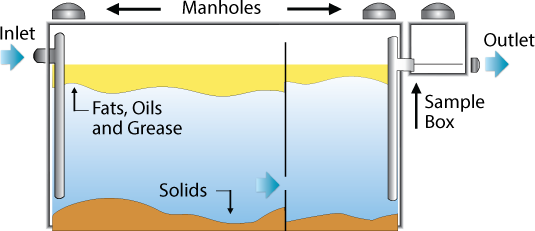What Is FOG? – Fats, Oils & Grease Prevention for Commercial Kitchens
FOG stands for Fats, Oils, and Grease, all of which can seriously damage your plumbing and the public sewer system. FOG includes animal fats, vegetable oils, and cooking grease—commonly produced in commercial kitchens and restaurants. When improperly disposed of, FOG causes blockages, backups, and overflows in sewer lines.
Tip: Pour grease and used oil into a sealable coffee can or disposable container—never down the drain.
How FOG Damages the Sewer System
When FOG is poured down the drain, it may be liquid at first, but it cools and hardens in your pipes. Over time, this creates severe blockages, restricting wastewater flow and leading to overflows or expensive repairs.

Grease is one of the leading causes of sewer clogs and overflows in commercial plumbing systems.
How to Prevent FOG Damage
1. Wash Equipment in the Right Location
Always wash floor mats, grills, and hood filters in mop sinks connected to grease control devices. Never wash greasy equipment in areas that drain to the storm system or public street.
2. Safe In-Kitchen Practices
- Post “No Grease” signs near sinks.
- Use garbage disposals sparingly—they fill grease traps quickly.
- Educate and train all staff on FOG control protocols.
- Wipe down cookware with paper towels before rinsing.
- Use sink strainers to capture food solids and discard in trash.
3. Proper Outdoor Grease Storage
- Use sealed, leak-proof containers with tight-fitting lids.
- Do not pour grease down any drain or storm grate.
- Keep containers away from storm drains or traffic areas.
- Secure containers to prevent spills or unauthorized use.
- Inspect and maintain the storage area regularly.
- Dispose of greasy food waste in the trash—not the disposal.
Grease Trap Compliance for Restaurants
- Install an approved grease trap or interceptor.
- Maintain the unit by scheduling regular pump-outs or cleaning.
- Keep records of grease trap maintenance for health inspections.
- Train staff in best management practices for FOG control.
- Wash hood filters and floor equipment only in sinks that route to a grease trap.

Note: Grease and solids in interceptors must not exceed 25% of total volume.
What to Do in the Event of a Grease Spill
- Start cleanup immediately using absorbent material.
- Do NOT use detergents or degreasers.
- Block nearby storm drains to contain the spill.
- Call a professional cleanup contractor if the spill is large.
- Never rinse spills into streets or storm systems.
- Dispose of cleanup materials in the trash—not the drain.
View Terms & Conditions & Service Disclaimers
Trademark Notice: MCM Plumbing™ is a trademark owned exclusively by MCM Plumbing. Unauthorized use of the name, logo, or any likeness is strictly prohibited without written permission.
